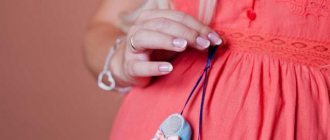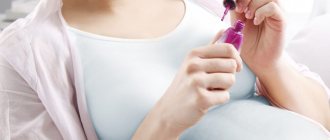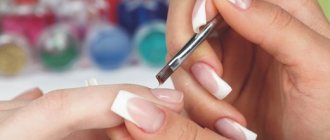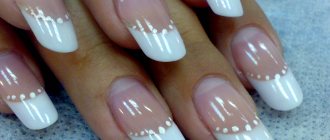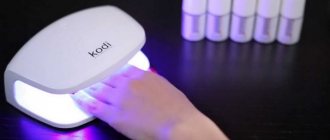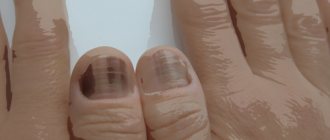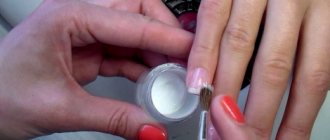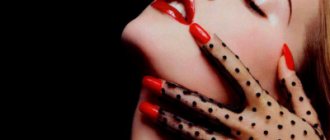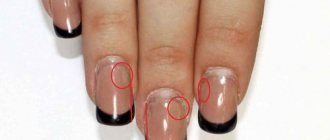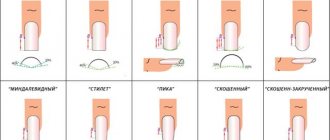Many people want to get a creative manicure using extensions. Expectant mothers are no exception, striving even in an “interesting situation” to look attractive and well-groomed. How dangerous a routine procedure can be for the mother and fetus. Should I forget about it for the whole 9 months or can I have a cosmetic session sometimes? We will look at the effect of nail extensions on the course of pregnancy in this article.
What is nail extension?
There are probably no women left in the world who do not know what nail extensions are. This is one of the most popular procedures, in which a specially trained specialist, or nail master, artificially lengthens and strengthens the nail plate using special materials that gain strength thanks to an ultraviolet lamp. Previously, acrylic was used for this, but now gel has gained great popularity.
Extended nails now look much more natural than they did several decades ago. They are strong, shiny, thin, so they can easily be confused with natural nails. The extension procedure itself takes no more than 2-3 hours, and nail art masters sometimes create real masterpieces on their nails, after which a woman may not think about manicure at all for 3-4 weeks.
However, there is also another side to the coin. Various gels, degreasers, and bases contain chemical compounds, and this can be detected by smell during extensions. The woman may notice an odor reminiscent of paint or glue.
The second point is damage to your own nails. The master processes the nail plate with hard files and uses a burr, and exposure to ultraviolet radiation negatively affects the condition of the surface layers of the nails.
The third point is the slight burning sensation that the client experiences when he places his palm in the ultraviolet lamp.
Despite all these disadvantages, the nail extension procedure does not lose its relevance, and many women have been using this method of decorating their own fingers for years.
If a pregnant woman is a manicurist herself
What if the manicurist herself is expecting a baby? It just so happens that many masters are engaged in this activity almost until the very birth. There is only one piece of advice: the health of the baby and the expectant mother is more important.
But if there is no way out, then you need to follow several rules:
- work in a well-ventilated area;
- refuse to work with acrylic;
- use gloves and a mask;
- have a first aid kit if microtraumas have been caused;
- periodically get up and walk around the office to improve blood flow in the pelvic organs (2 minutes, during which the client dries the next layer, is quite enough).
Should the procedure be done during pregnancy?
Many women, finding themselves in an “interesting situation,” do not even think that it might be better to refuse nail extensions. Others, on the contrary, try to exclude any manipulations that, even with the slightest probability, could harm her or her baby.
Even specialists do not have a clear answer to the question of whether to do the procedure during pregnancy. There are ardent opponents of nail extensions for expectant mothers, because the toxic substances contained in the materials are very dangerous for the fetus. But there are also supporters of various types of self-care during pregnancy, including high-quality manicures.
They claim that modern gels are completely safe, are made using non-toxic components and do not harm the fetus in any way.
The best solution is to listen to your inner voice. If the expectant mother is worried about her condition or the condition of the child, of course, it is better to temporarily stop visiting the manicure salon and give your nails a rest. Excessive anxiety and stress do not have the best effect on pregnancy.
But if a woman cannot even think that nail extensions can have a detrimental effect on her health or the development of the child in the womb, you can continue to do the procedure.
The only period about which experts have a relatively unanimous opinion is the first trimester. In the early stages, it is better to really refrain from nail extensions, if only because during the procedure a woman may suddenly become ill, because toxicosis does not appear according to schedule.
More on the topic
Is it possible to avoid toxicosis during pregnancy?
Can there be toxicosis during a frozen pregnancy?
Can ovulation occur during pregnancy?
How to care for your nails during pregnancy?
Treatment of nail fungus during pregnancy
Is it possible to get nail extensions for pregnant women?
The procedure is considered a relatively new technique. Therefore, its effect on the body of the expectant mother and the developing fetus has not been fully studied. The main questions concern the influence of chemicals used during the session:
- glue for tips;
- antiseptic;
- primer;
- finish gel;
- modeling gel;
- acrylic paints.
The materials emit volatile substances that spread throughout the room and are inhaled by everyone present. Gynecologists have not yet developed a consensus regarding prohibitions on nail extensions while bearing a child. But most of them still recommend refraining from the procedure, at least in the first 12 weeks.
There is an opinion that it is better for pregnant women to use gel for extensions, since it is odorless. However, when cured, the material evaporates in the same way as acrylic, so the opinion about its safety is erroneous.
Are nail extensions harmful during pregnancy?
Nail extensions can be harmful during pregnancy if the artist uses low-quality materials and does not care about the sterilization of instruments and the safety of their clients. Objectively, toxic substances do not penetrate the mother’s body through the nail plate and are not capable of harming the baby. However, when inhaling the vapors emitted by the material, the mother risks harming the child.
But there is a nuance here too. It’s one thing if a nail technician who has to work with these materials every day is in a “position.” But going to the salon once a month is unlikely to significantly affect the development of the fetus and cause irreversible changes in its growth and organ formation, although this may happen in the first trimester.
Nail extensions may be inappropriate for other reasons.
- Allergy. It may often come as a surprise to a woman that she has been growing her nails for several years without problems, but during pregnancy she suddenly developed an allergy to the materials. This is completely ordinary, because the expectant mother’s immunity is weakened, so allergic reactions appear quite often and do not surprise doctors.
- Deterioration in health. The reaction to the procedure in pregnant women can be unpredictable: nausea, dizziness, hot flash, weakness. Even the burning sensation from an ultraviolet lamp can be felt worse and seem unbearable.
- Material rejection. Due to hormonal instability, there may be such an outcome that the nails will be easily damaged, peel off, break, or simply will not hold on.
Also in the first trimester, there is a risk that chemical exposure will still affect the development of the baby, negatively affect the formation of organs and lead to congenital developmental anomalies.
Acrylic

This material is absolutely safe, although it is this material that arouses the greatest suspicion among most expectant mothers. The fact is that acrylic has a very strong unpleasant odor, which many perceive as evidence of its toxicity. However, this type of extension uses a number of products that contain formaldehyde.

But its content in these materials is minimal. Formaldehyde is found in simple nail polishes and some nail polish removers. Thus, if you are wondering whether pregnant women can have their nails extended with gel or acrylic, then this parameter should not worry you, unless you are afraid of painting your nails. Formaldehyde is toxic only in large quantities, many tens and even hundreds of times higher than its content in varnish and other nail products.
When carrying out acrylic extensions, it is worth paying special attention to where the master’s workplace is located. Since acrylic has a strong odor, in combination with toxicosis and general weakness characteristic of pregnant women, it can cause fainting. Therefore, make sure that the room is well ventilated and there is an exhaust hood near you.
https://youtu.be/UTwqJcNckMU
[yandex3] [google3]
Precautionary measures
If the expectant mother nevertheless decides to continue to extend her nails, she must take precautions.
Firstly, you need to choose a good salon and a good craftsman who takes a responsible approach to his work, carefully processes the tools and does not skimp on materials. The experience of the master is also important, because if a self-taught or student injures the delicate skin around the nails, infection can easily penetrate there.
Secondly, it is better to avoid acrylic. Gel technology is preferred for expectant mothers. It’s even better to replace extensions with strengthening the nail plate using biogel. It is completely safe, does not require rough filing of your nails, but the manicure is no less impressive.
During extensions, it is advisable to wear a medical mask to limit the entry of harmful vapors through the nose. After the procedure, you need to wash your hands well with soap and rinse your nose with mineral or sea water.
Another protective measure is to put rubber gloves on the client's hands. The “tops” of the fingers need to be cut off so that the master is comfortable and the skin of the hands is protected from ultraviolet radiation.
If after extensions you suddenly develop an allergy or your nails begin to break and peel more than before pregnancy, you should definitely abandon the procedure during pregnancy.
Pregnancy is not a reason to deny yourself everything, much less look unattractive. If a woman wants to have her nails extended and does not think that it could be harmful to the child, she can do this, following safety precautions. The exception is the first trimester, while the baby’s main organs are being formed. If negative reactions occur during the procedure, it should be abandoned.
Especially for beremennost.net Elena TOLOCHIK
Nuances and tips for the procedure
If a decision has been made in favor of false nails, the procedure must be taken responsibly and steps must be taken to make the session as safe as possible for the health of the mother and child. First of all, preference should be given only to a well-established master, for which purpose collect all kinds of information about him from friends.
An incorrectly performed procedure will not only lead to rapid peeling of the nails, but can also seriously damage them, causing itching sensations already in the first hours after the manicure. In this case, the artificial material will have to be removed, and the nail plates will not look their best after that.
Before the procedure, you need to check the composition of all products that will be used for manicure. You can learn about their effect on the body via the Internet. If you have a gadget with you, this can be done on the spot; if you don’t, ask the specialist in advance about the products used and check it at home.
During the manicure, it is better to wear a mask or respirator. However, not every woman will decide to do this, given that the session lasts several hours. You need to ensure that throughout the entire extension procedure you do not bring your nails closer to your face at a distance closer than fifty centimeters.
It is advisable to breathe through your nose; if you have a deviated nasal septum, this is problematic, so you need to make sure that your fingers are at a great distance from your face. Upon returning home, you will need to rinse the nasal mucosa with saline solution, mineral water or just clean water.
Manicure during pregnancy
Manicure during pregnancy is not prohibited by gynecologists. It is not harmful, provided that the correct instrument handling technique is followed and specialized materials are used. If desired, a woman can arrange for a master to work with her tools. Perhaps this will cause the master certain difficulties, but it is possible to try to resolve the issue. Today's service of such services is so developed that it is ready to meet the client halfway.
Is it possible to do this at the beginning of pregnancy with toxicosis?
The onset of pregnancy has nothing to do with specialists banning manicures.
If the first weeks are accompanied by toxicosis, then of course you should refuse the coating. And this is not at all for medical reasons, but rather because of the inconvenience associated with odors. Regarding the issue of safety, here you need to carefully read what is written on the label and study the composition of the varnish.
No need to buy cheap varnish. As a rule, it contains a large amount of toxic substances, which in turn has a negative effect on the baby. A low-quality product will also provoke an allergic reaction in a pregnant girl.
No less important is the issue of removing the coating. This process involves the use of a special liquid. It is applied to the nails and removed after a few minutes. The duration of this procedure is insignificant, however, all this time the pregnant woman inhales vapors of a chemical solvent.
Is it possible to do it later?
Manicure can be performed at any stage of pregnancy. It is advisable to use the most acceptable substances that do not contain acetone to remove nail polish.
Possible consequences

Before deciding to undergo the procedure, a woman should familiarize herself with the possible complications. These include:
- pathologies of fetal development;
- allergic reaction;
- toxic poisoning;
- respiratory tract disease;
- exacerbation of toxicosis.
The right choice of salon and manicurist will help reduce the risk of negative aspects. Before the procedure, you need to pay attention to sanitary standards . The workplace and tools must be processed. The master must carry out the work wearing gloves. The client's hands are also disinfected.
REFERENCE! Taking prenatal vitamins causes your nails to grow faster than before. Extension procedures in this case will be more frequent.
Is it possible to get a pedicure during pregnancy?
During pregnancy, a woman's legs are subject to a lot of stress.
That is why the feet should be given due attention. You can get a pedicure. The woman herself decides what kind of care she likes. This can be either edged or hardware. The second is preferable to those whose heels have dry corns, rough skin, and toes calluses. In addition to foot care, the specialist usually performs a relaxing massage. It will have a positive effect, if not on the physical condition of the pregnant woman, but on the emotional one.

